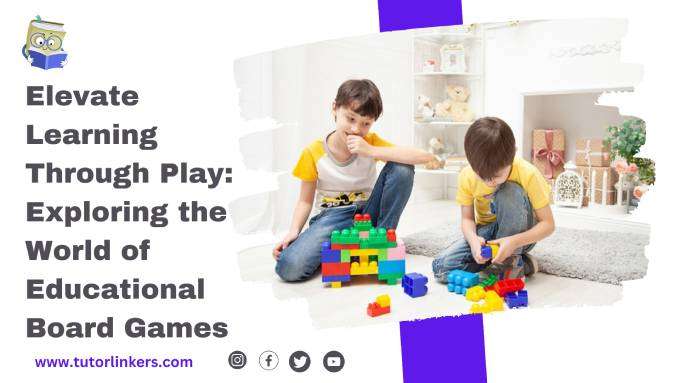World of Educational Board Games: In recent years, educational board games have emerged as powerful tools for enhancing learning experiences. Gone are the days when board games were solely associated with entertainment. Today, they serve as valuable resources in classrooms, homeschooling environments, and even remote learning setups. This blog post delves into the world of educational board games, highlighting their benefits, types, incorporation into learning, and future trends.
Benefits of Educational Board Games
| Benefit | Description |
|---|---|
| Enhance Learning | Educational board games provide opportunities for active learning, engaging students in hands-on experiences. |
| Develop Skills | These games help develop a wide range of skills, including critical thinking, problem-solving, and communication. |
| Foster Social Skills | Board games encourage social interaction and cooperation, fostering teamwork and communication among players. |
| Promote Fun Learning | By making learning enjoyable and entertaining, educational board games motivate students to actively participate. |
| Cater to Different Ages | There are educational board games available for various age groups and skill levels, catering to diverse learners. |
Educational board games offer a plethora of benefits that extend beyond mere entertainment. They stimulate cognitive skills such as critical thinking, problem-solving, and decision-making. Moreover, they foster social and emotional development by promoting teamwork, communication, and empathy among players. Most importantly, these games make learning enjoyable and engaging, motivating students to actively participate in educational activities.
Types of Educational Board Games
Educational board games come in various types, catering to different subjects, skills, and age groups. Subject-specific games focus on topics like math, language arts, science, history, and geography, providing targeted learning experiences. Skill-based games emphasize strategic thinking, deduction, memory, and creativity, challenging players to hone specific abilities. Additionally, cooperative games encourage collaboration and teamwork, fostering a sense of unity and shared achievement among players.
Popular Educational Board Games
Several educational board games have gained popularity for their effectiveness in promoting learning and skill development. Examples include Settlers of Catan, a strategy game that teaches resource management and negotiation skills, and Ticket to Ride, which enhances geographical knowledge and critical thinking. Scrabble challenges players’ vocabulary and language skills, while Codenames fosters communication and deduction abilities. Pandemic, a cooperative game, teaches teamwork and problem-solving as players work together to prevent global outbreaks.
Incorporating Educational Board Games in Learning
Integrating board games into learning environments requires thoughtful planning and consideration. Educators can strategically incorporate board games into classroom curriculum and homeschooling routines to reinforce learning objectives and engage students. Parents and educators should select games based on age appropriateness, learning goals, and player preferences. By using board games as supplementary learning tools, students can experience hands-on, interactive learning experiences that enhance their understanding and retention of concepts.
Educational Board Games in Remote Learning
| Aspect | Description |
|---|---|
| Virtual Platforms | Educational board games are adapted to virtual platforms, allowing remote learners to access them online through computers, tablets, or smartphones. |
| Digital Adaptations | Many board games have digital adaptations or online versions, offering remote learners the opportunity to engage in gameplay and learning activities from anywhere with internet access. |
| Challenges and Benefits | Remote learning presents both challenges and benefits for educational board games, including issues with access and connectivity but also the potential for broader reach and inclusivity. |
In the era of remote learning, educational board games have transitioned seamlessly into virtual environments. Digital adaptations and online platforms offer opportunities for students to engage with board games from the comfort of their homes. While challenges such as access and connectivity exist, educators can leverage virtual board game platforms to create interactive learning experiences and promote collaboration among remote learners.
Engaging Students Through Educational Board Games
Creating a positive gaming experience is essential for maximizing the educational benefits of board games. Educators and parents can foster enthusiasm and active participation by selecting games that align with students’ interests and abilities. Facilitating discussions, debriefs, and reflections after gameplay encourages students to reflect on their learning experiences and reinforces key concepts and skills.
Addressing Challenges and Concerns
Despite the numerous benefits of educational board games, challenges such as logistical issues and misconceptions may arise. Addressing concerns about storage, setup, and cleanup can alleviate logistical challenges associated with using board games in educational settings. Moreover, dispelling misconceptions about the frivolity of board games as mere entertainment underscores their educational value and promotes their widespread adoption in learning environments.
Future Trends and Innovations
As technology continues to evolve, so do educational board games. Emerging trends such as gamification, augmented reality, and digital platforms offer exciting possibilities for the future of educational gaming. These innovations have the potential to revolutionize learning environments, making educational board games more accessible, interactive, and immersive than ever before.
Conclusion
Educational board games represent a dynamic and effective approach to learning that combines the benefits of play with the rigors of academic achievement. By embracing the power of educational board games, educators, parents, and learners can transform learning experiences, making them more enjoyable, engaging, and impactful. As we continue to explore the world of educational board games, let us foster a culture of curiosity, creativity, and collaboration, enriching the educational journey for generations to come.

Read more: Graphing calculators for students
FAQ’s
- How can I access educational board games for remote learning?
- Answer: Educational board games for remote learning can be accessed through various virtual platforms, online stores, or educational websites. Look for digital adaptations or online versions of popular board games that are suitable for remote gameplay.
- What are some challenges of using educational board games in remote learning?
- Answer: Challenges of using educational board games in remote learning include issues with access and connectivity, especially for students with limited internet access or technical resources. Additionally, ensuring engagement and participation in remote gameplay can be challenging compared to in-person interactions.
- Are there any benefits to using educational board games in remote learning?
- Answer: Yes, there are several benefits to using educational board games in remote learning. These games offer interactive and engaging learning experiences that can motivate students and enhance comprehension. Additionally, digital adaptations and online versions of board games provide flexibility and accessibility for remote learners, allowing them to participate in learning activities from anywhere with internet access.
Author
Ehsan Ali is a seasoned content writer and researcher with a talent for translating complex concepts into clear, engaging content. With a deep understanding of human behavior, societal trends, and technical topics, Ehsan creates insightful and impactful content that resonates with a broad audience. His expertise ensures that each piece is both accessible and compelling, bridging the gap between intricate details and everyday understanding.




